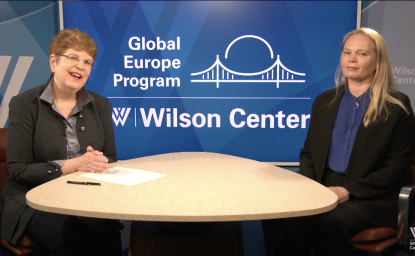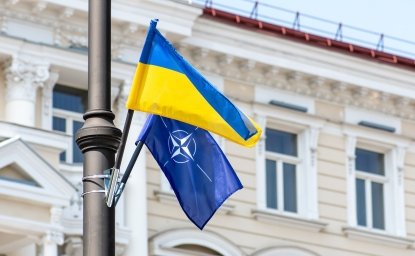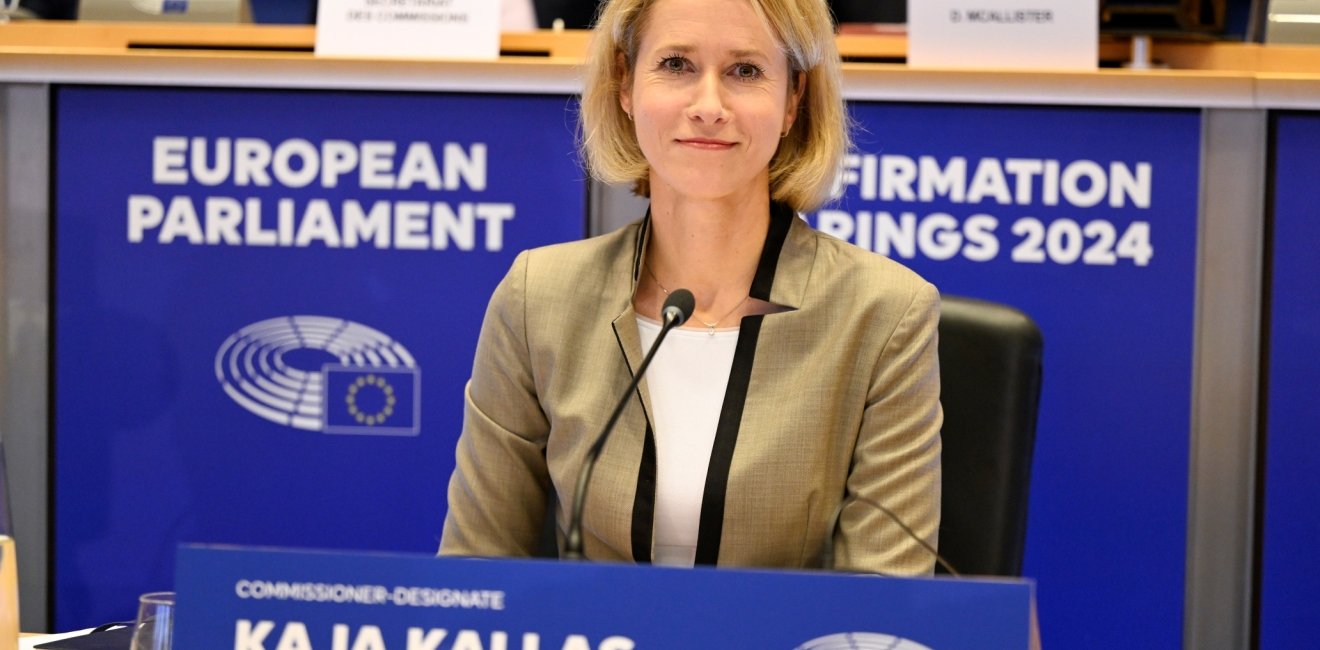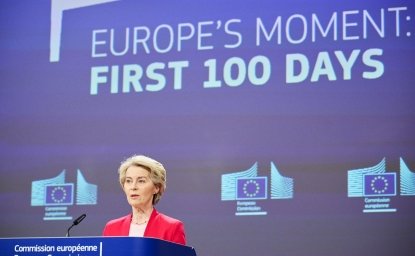Introduction
Former Estonian Prime Minister Kaja Kallas has now been confirmed as the new High Representative for Foreign and Security Policy (HRVP) following the November 12 hearing. Dubbed "Estonia’s Iron Lady" and the first head of government to be placed on Russia's wanted list, she now inherits a role that has faced significant criticism over the past few years, even being called “the EU’s most pointless job.”
Her predecessor, Josep Borrell Fontelles, faced a series of crises that outpaced the design of the HRVP role: a turbulent enlargement agenda, the COVID-19 pandemic, Russia's full-scale invasion of Ukraine, and conflicts in the Middle East.
Kallas’s "pragmatic" politics, supported by French President Macron, have made her the EU’s chief diplomat. Following in the footsteps of her father, who served as the Prime Minister of Estonia and as a European Commissioner, Kallas also served as a member of the Estonian Parliament and the European Parliament. As the first High Representative from post-communist Europe and from the Baltic states, Kallas is well-versed in Russia. In 2024, she received the Walther Rathenau Prize for her foreign policy leadership in supporting Ukraine’s fight against Russian aggression.
Today, the fires are all around; Russia is only one concern, and the EU thus far has yet to find consensus on a course of action. The question, therefore, is whether Kallas’ pragmatism can overcome the EU’s challenges and the internal constraints on the role to transform the EU from a rhetorical actor to a global leader once more.
Talking to The New Statesman, she said, “Our neighbors’ problems today are our problems tomorrow.” She continued, “So if your neighbor’s house [is in flames], it’s better to put out the fire there than to wait until the fire reaches your house.” That is her task as chief diplomat—corral member states to common positions so the EU can put out its neighbors’ fires–and these are the challenges facing her term and her vision to take them on.
In her first weeks on the job, Kallas will lead the effort on continuing support for Ukraine amid uncertainties on Washington’s position and leading possible negotiations with Russia on behalf of the EU.
European Defence and Security
Kaja Kallas has been given a vote of confidence with a clear mandate and expectations for the EU’s foreign policy, security, and defense by the European Commission President, Ursula von der Leyen. In her Mission Letter to Kallas, von der Leyen outlines the main priorities to addressing this new era of geostrategic rivalries. One of the main and most challenging tasks for Kallas during her tenure will be to build up a European Defense Union, together with the newly established role of the Commissioner on Defense and Space.
Furthermore, Kallas will be facing the challenge of successfully navigating the transatlantic relationship with the new presidential administration in Washington while strengthening the EU-NATO partnership.
In her first weeks on the job, Kallas will lead the effort on continuing support for Ukraine amid uncertainties on Washington’s position and leading possible negotiations with Russia on behalf of the EU. As war fatigue sets in across the EU, a major priority for Kallas will be ensuring coordination among EU member states to deliver consistent and timely military aid to Ukraine while addressing differing views within the bloc. Equally important is keeping EU members united in enforcing sanctions against Russia. Additionally, Kallas will help shape a united EU response to Russia while managing the interests of global powers like China and the US.
Kallas is the first HRVP to inherit such a volatile European security climate, with mandates for defense industrial reform, all while conventional partnerships take on new shapes. Kallas will be subject to significant pressure from member states to perform in this area, as this challenge has been the driving force behind her appointment to the HRVP role.
Mediterranean Policy
In the southern neighbourhood, Kallas faces the dual challenge of addressing divisions within the EU on the Middle East conflict and achieving consensus on migration.
Deep splits among EU member states—ranging from staunchly pro-Israel countries like Germany, Hungary, and the Czech Republic to more pro-Palestinian nations like Spain and Ireland—have left the EU, and outgoing HRVP Josep Borrell, reliant on rhetoric rather than coordinated action.
She is undertaking a role in which her predecessor proposed suspending diplomatic dialogue with Israel over their lack of adherence to international law. Kallas has stuck close to the EU line, emphasizing Israel’s right to self-defense while advocating for adherence to humanitarian law and a two-state solution.
Generating consensus on this issue will be a principal challenge in her tenure. In October, the Czech Republic blocked a joint statement calling for a ceasefire between Israel and Hezbollah, leaving Borrell to act unilaterally, undermining the EU’s credibility.
With migration and asylum at the top of the political agenda, the EU is similarly without consensus. Italy controversially advocates normalization with Syria to facilitate deportations, and Hungary and the Netherlands have opted out of EU migration rules. With the lightning offensive of rebel Syrian forces that took Aleppo on December 1, migration from Syria, normalization with the current government and relations with Turkey may take new forms during Kallas’s tenure.
Kallas has advocated for addressing the root causes of migration from Africa through development and combating human trafficking. She also views the southern neighborhood as a place of great power competition, particularly as China increasingly exerts its influence in the region.
The EU's Mediterranean policy exemplifies Kalla's greatest challenge: how to fulfill the role of the HRVP, where the EU can assert its influence and maintain cohesion.
Already in the previous Commission, the imposition of tariffs on Chinese electric vehicles exposed fault lines among member states on how the EU should address its trade relations with China. The primary challenge therefore remains how to sustain the efforts to de-risk from China to address the EU’s vulnerabilities in key sectors.
Trade and Economic Diplomacy
As part of her mandate as the HRVP, Kaja Kallas is also tasked with shaping a “new foreign economic policy.” Together with Executive Vice President Maroš Šefčovič, she will focus on developing a new strategy for “economic security and statecraft, free and fair trade and investing in mutually beneficial partnerships around the world.” While trade and economic policy are not her primary portfolio, Kallas will play a vital role in the EU's external engagement when it comes to trade.
Her first challenge will be to break the stalemate on the EU-Mercosur free trade agreement (FTA). Since the initial political agreement in 2019, the FTA has received backlash from various stakeholders for lacking environmental safeguards and creating unfair competition. France, in particular, has been the most vocal opponent to the implementation of the agreement, with its domestic agricultural sector fearing a surge of agricultural products from South America. However, Kallas seems to be determined to bring the agreement across the finish line, as well as expand trade relations with other actors. She sees this as the best strategy to prevent a trade “void” in these countries to “be filled by China”.
In her European Parliament hearing, Kaja Kallas also acknowledged that China has become “more a competitor and a systemic rival” than a partner for cooperation. This signals an important shift in the EU's China policy. However, already in the previous Commission, the imposition of tariffs on Chinese electric vehicles exposed fault lines among member states on how the EU should address its trade relations with China. The primary challenge therefore remains how to sustain the efforts to de-risk from China to address the EU’s vulnerabilities in key sectors.
Looming large over her mandate is also the transatlantic partnership. Kallas will have to engage with a new US administration that has proposed imposing tariffs on all European exports. While the future of the Trade and Technology Council remains uncertain, avoiding a full-blown trade war with the United States is a top priority. Kallas’ framing of global threats and shared challenges, especially the role of China and EU’s increased responsibility in defense and Ukraine, could yield fruitful results in maintaining dialogue with the new US administration. Such efforts will be crucial in trying to diffuse the perceived tensions with Europe’s strongest ally.
In times when the EU faces tensions with its two main trade partners, the United States and China, the challenge for Kallas will be how the EU’s new foreign economic policy will balance between remaining the herald of free trade and building up its economic security.
EU Enlargement
Russia's full-scale invasion of Ukraine in 2022 served as a wake-up call for Europe, prompting a reevaluation of its enlargement policy. In June 2022, Moldova and Ukraine were officially granted candidate status by the EU. In December 2023, the EU decided to open accession negotiations with Moldova and Ukraine and granted candidate status to Georgia. Three months later, Bosnia and Herzegovina was invited to begin accession talks.
Despite this renewed momentum, the process has recently again begun to falter. In September 2024, the EU decided to decouple Albania’s accession path from North Macedonia's due to the latter's ongoing bilateral dispute with Bulgaria. To lift the veto imposed by Bulgaria, North Macedonia must amend its constitution to formally recognize its “ethnic Bulgarian minority as one of the state’s founding peoples”-- something the recently elected government has been reluctant to do.
In addition, Kosovo remains the only country that has applied for EU membership but has not been recognized by the EU as a candidate country, due to the ongoing Kosovo-Serbia dispute. The EU has been trying to resolve the conflict through its own facilitated Kosovo-Serbia Dialogue, with efforts intensifying after Russia’s invasion of Ukraine that culminated in the Ohrid Agreement. However, the new agreement failed to normalize relations between the two countries, as neither party has committed to its implementation. This slow progress has fueled tensions and recurring clashes in the north of Kosovo and damaged the EU’s reputation in the region. Revitalizing the Dialogue will be challenging for Kallas, who is expected to appoint a new special envoy in January 2025.
Rising tensions between Kosovo and Serbia, the power-sharing stalemate in Bosnia and Herzegovina, Russian foreign interference, and most recently the announcement by the Georgian government to halt its EU membership talks all underscore one message: keeping enlargement prospects alive may prove a formidable task.
Following the Georgian government's recent announcement to suspend EU membership negotiations until 2028, Kallas will also need to navigate how the EU can further support the will of the Georgian population, which overwhelmingly favors Euro-Atlantic integration.
In the next five years, the new Commission wants to achieve meaningful progress, bringing candidate countries closer to the Union. However, rising tensions between Kosovo and Serbia, the power-sharing stalemate in Bosnia and Herzegovina, Russian foreign interference, and most recently the announcement by the Georgian government to halt its EU membership talks all underscore one message: keeping enlargement prospects alive may prove a formidable task.
Conclusion
HRVP Kallas faces many of the same challenges as her predecessor did, only now with increased stakes and new challenges to boot. Going into the role, she will have to confront European security and defense industrial reform; Russia's ongoing invasion of Ukraine; a worsening migration crisis from climate change and the widening Middle East conflict; a splintering transatlantic relationship under increased stress due to China-US competition; and an enlargement agenda in question as Russia’s grip grows in Moldova and Georgia and tensions rise between Kosovo and Serbia. Expectations and demand are high, yet the constraints to the HRVP role in balancing unanimity seem greater. Kaja Kallas faces her biggest challenge yet—to turn reform into action while putting out fires across Europe’s neighborhoods.
Authors

Postdoctoral Fellow, Johns Hopkins School of Advanced International Studies




Global Europe Program
The Global Europe Program is focused on Europe’s capabilities, and how it engages on critical global issues. We investigate European approaches to critical global issues. We examine Europe’s relations with Russia and Eurasia, China and the Indo-Pacific, the Middle East and Africa. Our initiatives include “Ukraine in Europe”—an examination of what it will take to make Ukraine’s European future a reality. But we also examine the role of NATO, the European Union and the OSCE, Europe’s energy security, transatlantic trade disputes, and challenges to democracy. The Global Europe Program’s staff, scholars-in-residence, and Global Fellows participate in seminars, policy study groups, and international conferences to provide analytical recommendations to policy makers and the media. Read more

Explore More
Browse Insights & Analysis
The Growing Transatlantic “Big Tech” Rift Explained

The EU's Role in the Future of European Defense




